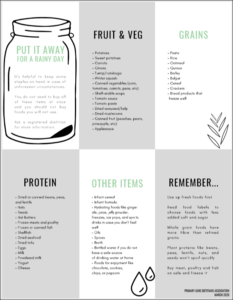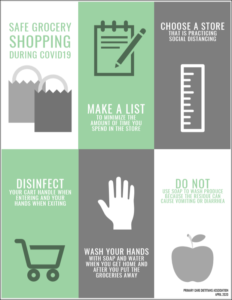 Food Storage and Safety
Food Storage and Safety
Saman Shaikh
Registered Dietitian
Certified Diabetes Educator
During the coronavirus pandemic, we are all practicing social/physical distancing, including limiting trips to the grocery store and preparing food at home more often. To make sure you have enough food to last you for a few weeks between grocery store trips, you need to buy foods that will keep and store well. Here are some tips for buying and storing foods that can help you eat healthily during this time:
Make a Plan
Plan healthy meals using what you already have and make a grocery list based on what you need. This can help you focus at the store and help you stick to your budget.
Buy foods that have a long shelf life
Vegetables and fruits such as potatoes, sweet potatoes, carrots, onions, squash, celery, apples and oranges can maintain their freshness for weeks or months. Pantry essentials such as pasta, rice, canned or dried beans, oats, cereal, nuts and nut butters, oils and spices are shelf stable and keep for a long time. In a pinch, you can also substitute dried or canned foods for fresh foods. For example, canned and frozen fruits and vegetables can be used in dishes, cereals, and smoothies. Dried or canned mushrooms can be a good alternative to fresh mushrooms. Skim milk powder and canned evaporated milk can be rehydrated for drinking and cooking.
Canned foods and processed foods may last a while, but they can also be high in sodium (salt) and additives. If you’re buying canned foods, try to buy low sodium options and use them only once in a while.
Use up perishable foods first
Soft fruits (berries, peaches, bananas) dairy and meat products are perishable and should be eaten first to prevent food waste.
Store foods properly to make them last longer
You can make certain foods last longer by storing them appropriately. Leafy greens and fresh herbs can be washed and dried, then wrapped in paper towels and stored in the fridge. Berries can also be washed in water and vinegar and stored in the fridge to make them last longer. Since the back of the fridge tends to be colder than the front or the door, store perishables such as dairy and eggs in the back. As well, hard cheeses can be wrapped in parchment paper or wax paper and kept in the fridge to make them last longer.
Some fruits and vegetables such as berries and bananas can be frozen. Peppers, onions, garlic, and tomatoes can also be chopped and frozen, as well as fresh herbs such as parsley and cilantro. Other foods that can be frozen include bread, milk, meat, hard cheese, and tomato paste.
Practice good hygiene
All Canadians should continue to follow good hygiene practices when handling food and preparing meals. Hands should be washed often and before preparing food. Wash produce well before eating it. Cook meat thoroughly, keep cold foods cold, and avoid cross-contamination between cooked and raw foods. Frequently touched surfaces, including countertops and cutting boards should be cleaned often. As well, people who are sick should not prepare food for others.
Please contact the Sharbot Lake Family Health Team at 613-279-2100 if you would like more information about healthy eating. Saman Shaikh, Registered Dietitian is available for virtual or phone appointments.

